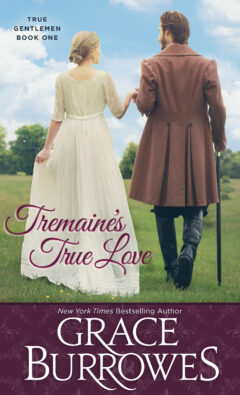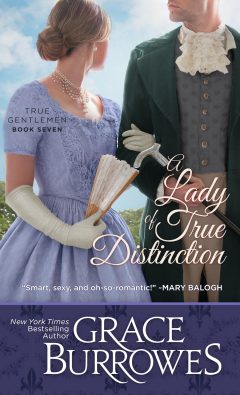The Last True Gentleman
Book 12 in the True Gentlemen series
Sycamore Dorning has watched one sibling after another succumb to the blandishments of wedded bliss, while he has grown wealthy and–deuce take it–lonely. He loves the ladies generally, though he waits in vain for the woman who can love him in all his contrary, stubborn, outspoken glory.
Jeanette, Marchioness of Tavistock, endured six years of wedded purgatory before earning the independence of widowhood. She’s admittedly attracted to Sycamore. He’s refreshingly blunt, no slave to convention, and loyal to those he cares about. When trouble stalks her, she turns to Sycamore for help, because she would trust him with her life. But will she trust him with her heart?
Enjoy An Excerpt







The Last True Gentleman
Chapter One
“Mr. Dorning, I come to offer you a proposition.”
Sycamore Dorning was frequently propositioned by ladies who’d played too deeply at The Coventry Club.
By gentlemen in the same unfortunate circumstances.
By gentlemen who’d gambled to excess, and thought to offer Sycamore a wife or mistress’s favors in exchange for forgiveness of a debt.
Jeanette, Marchioness of Tavistock owed the club not one penny, alas. “My lady, do come in.”
Her ladyship had no escort. Her coach was plain to the point of shabbiness. Neither coachy nor groom wore livery, and her cattle were stolid bays, not a hair of white between them. Moreover, she’d waited until well after dark to pay this call.
All quite intriguing. “Walk ’em,” Sycamore called out to the coachy.
John Coachman merely looked askance at the marchioness.
“Will you see me home, Mr. Dorning?” her ladyship asked.
“Of course.” Given the chance, Sycamore would have seen his guest safely returned from the underworld.
Lady Tavistock wasn’t conventionally pretty. She had auburn hair, forest green eyes, a nose shading toward well defined, and swooping brows that added an air of imperiousness. Sycamore had never heard her laugh, never seen her touch another in anything but strictest propriety. He did not want to merely escort this woman home, he wanted to matter to her.
She exuded such an air of self-contained calm that he also wanted to make her giggle, to hear her curse, to see her in high dudgeon, and in casual deshabille. He was ever the dreamer, in the opinion of his family.
“Mr. Dorning will see me home, Angus,” her ladyship called.
Angus spared Cam a glower, then moved the horses on at the walk. “Scottish?” Sycamore asked, closing the door.
“Scottish and former military, the confluence of all that is stubborn and loyal.”
“May I take your cloak?” A conspicuously drab article, given how fashionably attired the marchioness usually was.
She removed her plain straw bonnet, stashed her gloves in the crown, and passed it to Sycamore. He set the bonnet on a hook and drew the cloak from her ladyship’s shoulders. She watched him from the corner of her eye when he stepped behind her, as if expecting him to commence a seduction in the very foyer.
With other women, he had done exactly that on many occasions. Nothing ventured, nothing gained, after all.
“You arrive on my doorstep alone,” he said, “late at night, in a disgracefully ancient conveyance, and you speak to me of propositions. Are you hoping I will make amorous advances, or fearing I won’t?”
Her cloak bore a faint scent of jasmine, a light fragrance for woman of such… such…presence? Such consequence?
Sycamore did not know exactly how to describe her ladyship, which was characteristic of her appeal. Her smiles were rare and startlingly warm. She was ferociously protective her step-son, and at the card table, she was a shrewd and disciplined gambler. One of few in Sycamore’s experience who knew enough to walk away from both winning streaks and losing streaks.
“I assumed you would flirt,” she said. “and you are welcome to make whatever overtures will flatter your male vanity, but I came to talk rather than dally.”
“As it happens, I command equally vast stores of talent for both conversation and dallying, not that the two activities are mutually exclusive.” Sycamore offered the lady his arm. His longsuffering butler had gone to bed an hour ago, and the premises employed no night porter.
“You would rather dally,” her ladyship said, wrapping her fingers lightly around his sleeve. “You are an unattached, increasingly wealthy young man from a titled family. Dallying for such a one is almost a civic duty.”
Unattached, like a boot discarded by the side of the road, a weathered wagon wheel left leaning against the wall of the garden shed.
“What I prefer might surprise you,” Sycamore said, ushering her into his personal parlor. The fire was lit in here, as were the candles, but he’d chosen to entertain her in this room because this was his preferred place to idle about when at home. He wanted her ladyship to see his bound collections of satirical prints, the French novels any school girl could translate at sight, the botanical sketches every self-respecting Dorning considered necessary to a proper decoration scheme.
“Deadly nightshade?” her ladyship murmured, studying the frame to left of the dart board. She moved to the frame on the right. “Night blooming jasmine?”
“My father was a passionate amateur botanist. We all take an interest in plants, my own talent being the growing of potted ferns.”
Her ladyship eyed the massive specimen situated in the bow window. “We all?”
“We Dornings, of the Dorsetshire Dornings. I am one of nine.” She likely knew that, because her late husband had been a marquess, and Sycamore’s oldest brother was the Earl of Casriel. Polite Society kept track of its own.
“While I have only the one brother,” her ladyship said, applying a finger to the fern’s soil.
“You borrowed your brother’s coach tonight because you didn’t want anybody to know of this call, and yet you haven’t told me exactly why you’re here. Will you join me in a nightcap?”
She dusted her hands. “Armagnac, if you have it. Early spring nights are both chilly and damp.”
Early spring nights were lonely. Sycamore poured two servings of a lovely year and passed one to his guest. “To interesting propositions.”
Lady Tavistock eyed Sycamore over the rim of her glass as she sipped. “This is delightful.” Her second taste was less cautious. “You have something I want.”
Were Sycamore not tired, were he not missing the most recently married of his many recently married siblings, he might have replied with a reference to passionate kisses, a comfortable bed, or talented hands.
But he was tired and lonely, and no longer the randy boy her ladyship would dismiss at a glance.
“I have something you want.” He gestured to a pair of reading chair near the hearth. “Or do I have something you need?”
Her ladyship settled gracefully into a chair, glass in hand. “Want assuredly, need possibly. I don’t know as I’ve ever seen a collection of knives decorating an informal parlor before.”
Sycamore took the other reading chair. “My brother claimed displaying them elsewhere was in poor taste.” And why had she saved remarking on the blades fanned into a gleaming half-circle on the wall for after her polite notice of ferns and botanical prints?
“You are reported to be quite handy with a knife, Mr. Dorning.”
By firelight, her hair was a palette of myriad colors. Gold, russet, garnet… If asked, Sycamore would have said her hair was firelight-colored, while her hands wrapped around the crystal glass put him in mind of purring cats and sleepy cuddles.
“I am skilled with a blade,” Sycamore said, imbuing that statement with not even a hint of prurience.
“Will you teach me how to throw a knife?”
Of all the things she might have asked of Sycamore, that request hadn’t even been remotely on the list.
“Why, my lady?” Women took up the bow and arrow for diversion. They might on rare occasion participate in a shoot, particularly on their own family’s land. A few women rode to hounds, usually in the second or third flight.
But knife throwing?
“You ask me why.” She set her drink aside. “Because a knife doesn’t have to be kept dry at all times and loaded with shot and powder prior to each use. Because a knife can be carried in a reticule or pocket or sheathed to the body. A knife is silent and can be used again if the first throw misses—or if it doesn’t.”
Sycamore had only two sisters, and neither of them had much use for their Dorning menfolk. His mother had been a perpetually disappointed and disappointing virago, and by design, his lovers were more interested in pleasure than the man providing it.
He did not, in other words, have much experience fathoming the labyrinth of the adult female mind to any useful depth.
“I understand the allure of knives,” he said, “but why do you want to acquire skill with them?”
She picked up her drink and took another visual inventory of Sycamore’s private parlor. “I am not in the habit of explaining myself. Will you teach me or not?”
Her ladyship was very good at the subtle set down, but not quite good enough. “You are asking not only for instruction, but for my utmost discretion.”
“I am.”
She was a widowed marchioness of substantial means and considerable self-possession, and she wanted to learn—in secret—how to make a knife throw count.
“You can’t acquire the skill in a night,” Sycamore said. “Not in a week of nights.” Though practice would result in progress—a lot of practice which would be difficult for her to manage if she was bent on secrecy.
“Then we’d best get started, hadn’t we, Mr. Dorning?”
Would she be all business in bed too? No kissing, no touching her hair, God forbid anybody broke a sweat? For her sake, he hoped not.
“If I spend thankless hours teaching you the basics of how to handle a blade, what do you offer me in return?”
She turned a frankly curious gaze on him. “What do you want, Mr. Dorning?”
Sycamore wanted his brother Ash to take the same interest in The Coventry Club that he had before matrimony had turned Ash into a doting dimwit.
He wanted Casriel to get his lordly arse—and wife and kiddies—up to Town to vote his damned seat like a good little earl.
He wanted brother Oak to extricate himself from the embrace of rural Hampshire—and the embrace of marital bliss—and come to London to do some lecturing at the Royal Academy.
Of course, a romp or twenty with the marchioness would have been lovely too, but romping undertaken in return for services rendered wasn’t romping at all.
“Can you buy out Jonathan Tresham’s interest in the Coventry?” Sycamore asked.
“One wondered what the arrangement was. Yes, I can, but no, I will not. I am not a quick study, Mr. Dorning, but I am determined to acquire skill with a knife.”
She was also very good at keeping her emotions to herself, as any successful gambler must be.
Sycamore crossed an ankle over a knee. “You are doubtless a paragon in many regards, my lady. I am not a paragon, though I am a gentleman. I will show you the rudiments of the art as a favor between friends.”
She wrinkled her nose, probably because Sycamore had referred to himself as her friend. “How good are you?”
Sycamore smiled and sat forward as if to impart a confidence. In the next instant, the blade he carried in his left boot was silently quivering in the middle of the cork target across the room.
“I am that good.”
Her ladyship studied the blade until it was still. “You didn’t even look.” The marchioness, however, swiveled her gaze to Sycamore. She inspected him, no longer visually dismissing him, evading his eyes, or turning a wary regard on him.
“My dear marchioness, looking rather destroys the element of surprise, which is half the beauty of a well thrown knife.”
She crossed the room and withdrew the blade. “Teach me to do this, and you can demand almost anything of me in return.”
Almost. A prudent woman. “You hate to be in anybody’s debt, don’t you?” Sycamore had made her a loan once before, at a rural house party, and she had repaid him to the penny within days of the house party’s conclusion. The sum had been needed to cover her step-son’s gambling debts, and what consideration she had extracted from the hapless lad was a secret between her and his young lordship.
She passed Sycamore his knife and watched as he returned it to the sheath in his boot. “I loathe being in debt to anybody,” she said, “particularly a man. Women have little enough power, and a woman in debt is a woman all but asking to be exploited.”
Sycamore understood an independent nature, but not the bitterness behind her ladyship’s words. He also understood pride, however, and to become her ladyship’s instructor, he would have to surrender some scintilla of his own pride.
He had a bit to spare, after all. “Here is the favor I will accept in return for teaching you what you seek to know: Once a week, we will meet at the Coventry to practice throwing, and then you will dine with me on the premises.”
“Supper?” With a single word, she conjured a reference to all manner of hedonistic excesses.
“Food, wine, conversation. I can inflict some of my laughable French on you, you can tell me who is walking out with whom.”
The wariness had returned to her gaze, muted by curiosity. “You are serious?”
“I do not dissemble, even when my family dearly wishes I would.” Her ladyship still looked doubtful, so Sycamore resigned himself to explaining his situation to her.
“My brother Ash is my business partner, or he used to be. Now he’s too besotted with the wedded state to do more than keep an impatient eye on me at the club, not an eye on the club, mind you, an eye on me. When we talk it’s Della says, Della hopes, and my dear Della tells me. I love my sister by marriage—I love the entire herd of them—but Della has entirely made off with my dearest brother.”
Sycamore rose to pace rather than sit passively before her ladyship’s scrutiny. “I cannot gossip with anybody about club business, or with nobody but Tresham, and with him it’s Theodosia believes, my darling Theo would say, and more of same. Casriel is the worst of the lot. He’s awash in daughters, which adds entire rhapsodic chapters to his litany.”
Sycamore paused before the corkboard, which would soon have to be replaced, because the center was too pitted from multiple throws hitting the same mark.
“I spend almost every night,” he said, “amid the witty and wealthy, and while I can flirt, make small talk, and flatter until my eyelashes fall off, that’s not the same as a good meal with a pleasant companion.”
Her ladyship rose. She was tallish, but more than that, she carried herself regally. “I am rarely pleasant.”
“One of your many fine attributes.” Also one of Sycamore’s. “You are intelligent, well read, honest, and knowledgeable about polite society. Let’s give it a month, shall we? The Coventry is closed on Sundays. We’ll have privacy there and some room to practice.”
She had come to make him a proposition, but he’d purposely put himself in the posture of one making an offer.
“Four lessons and four suppers?”
“Or I can simply teach you to throw.” And thus put her subtly in his debt.
She stuck out a hand. “We have a bargain, Mr. Dorning. I will meet you at the side entrance to the Coventry at five on Sunday.”
Sycamore shook, pugilist-fashion, then bowed over her hand, gentleman-fashion. “I will look forward to it. Shall I call for my coach, or would you rather I walk you home?” He was several inches over six feet, though those inches had taken forever to show up. He also fenced, rode, and boxed, and considered himself a match for any footpad, even without his knives.
“I prefer to walk, please.”
The faster option, given that a groom and coachman would have to be roused and the horses put to. Also the less conspicuous choice.
Sycamore contented himself with the role of gallant escort, and parted from the lady at her front door. He made sure the night porter did not see him lurking at the foot of the terrace steps, and when her ladyship was safely behind a locked door, Sycamore returned to his own address by wandering several streets out of his way.
Two conclusions made his midnight stroll a thoughtful undertaking. First, in her determination to learn the art of the knife, her ladyship revealed a fear for her safety. Because she was neither fanciful nor stupid, Sycamore thus feared for her safety as well.
Second, whoever had followed her ladyship from Sycamore’s rooms had felt it unnecessary to follow Sycamore on his journey home.
Order your copy of The Last True Gentleman!
End of Excerpt
The Last True Gentleman is available in the following formats:

Grace Burrowes Publishing
February 23, 2021
- Grace’s BookstoreThis is Grace’s
independent
ebook store.
Your purchase can be added to any device. - Barnes & Noble Nook
- Kobo
- Apple Books
- Amazon Kindle
eBook:
Other eBook Purchase Options:
Print:
- Kobo UK
- Booktopia AUS
- Amazon UK
- Amazon Kindle UK
United Kingdom:
Connected Books
The Last True Gentleman is Book 12 in the True Gentlemen series. The full series reading order is as follows:
- Book 1: Tremaine’s True Love
- Book 2: Daniel’s True Desire
- Book 3: Will’s True Wish
- Book 4: His Lordship’s True Lady
- Book 5: My Own True Duchess
- Book 6: A Truly Perfect Gentleman
- Book 7: A Lady of True Distinction
- Book 8: A Woman of True Honor
- Book 9: A Lady’s Dream Come True
- Book 10: My Heart’s True Delight
- Book 11: Truly Beloved
- Book 12: The Last True Gentleman
























